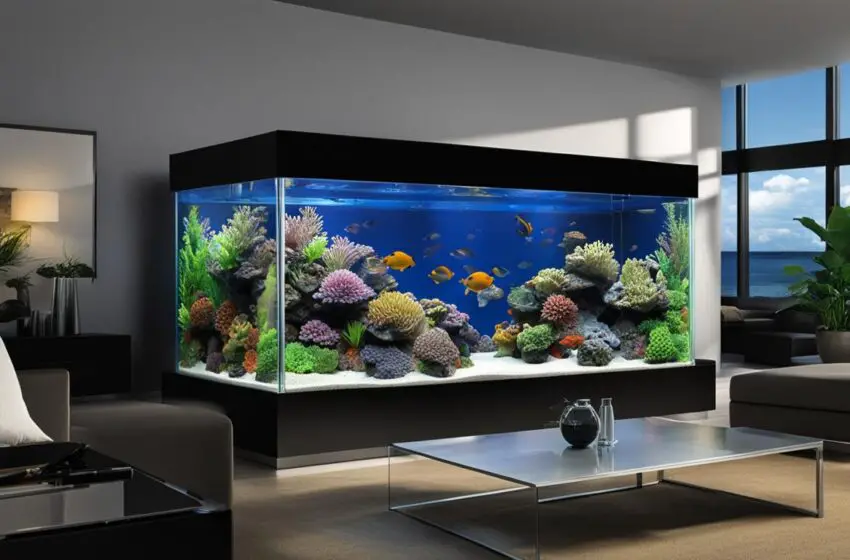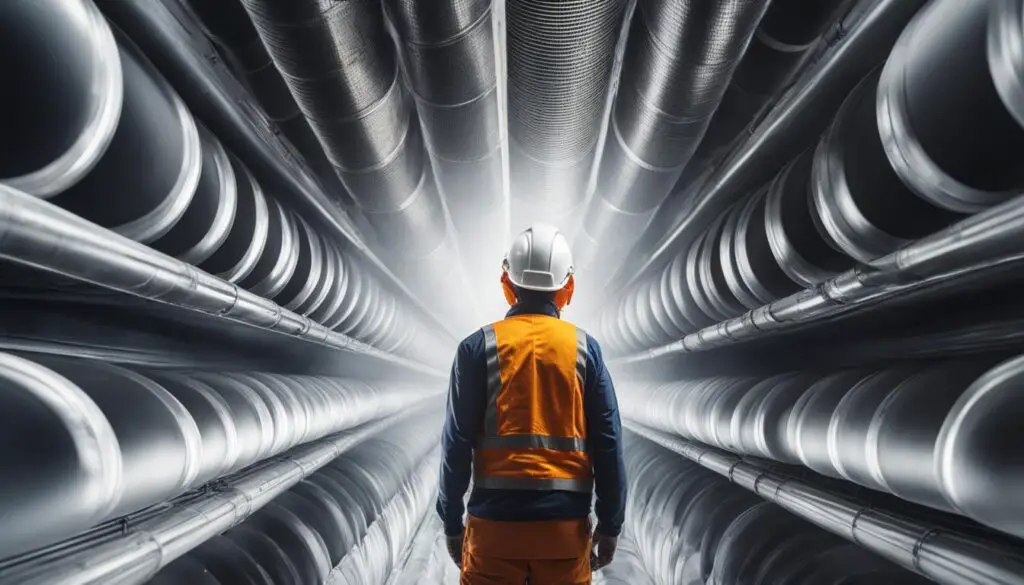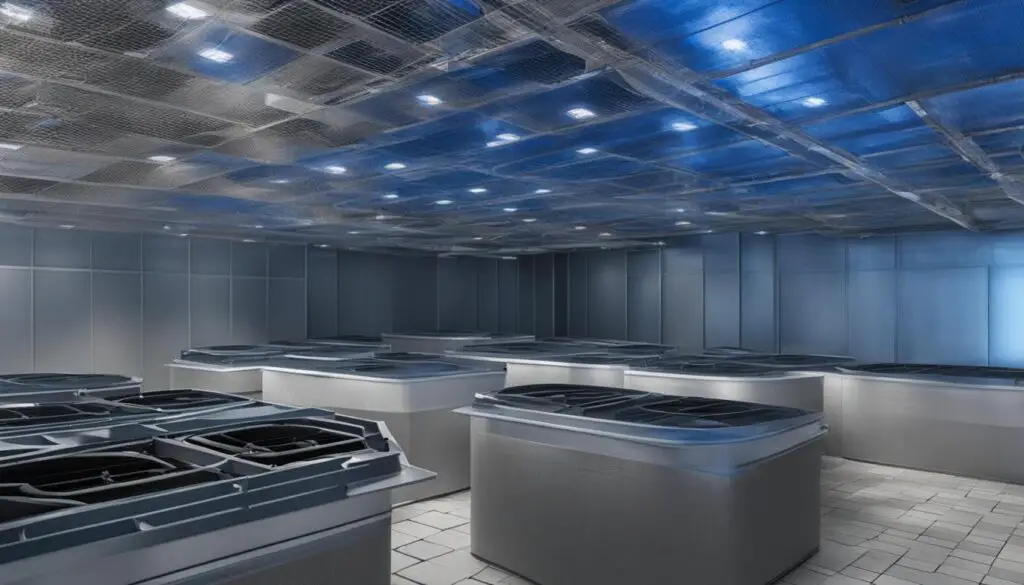Balancing Act: Energy Efficiency vs. Filtration Capacity

When it comes to maintaining the health and well-being of marine organisms in aquariums, energy-efficient filtration systems are paramount. These systems play a crucial role in maximizing marine aquarium health by effectively removing impurities from the water. However, finding the right balance between energy efficiency and filtration capacity is key to ensuring optimal performance.
Energy-efficient marine aquarium filtration systems offer several advantages. They not only minimize energy consumption but also provide effective water filtration, resulting in clean and healthy aquarium environments. By choosing the right filtration system, marine enthusiasts can create an ideal habitat for their aquatic animals while reducing their carbon footprint.
In this article, I will explore the importance of energy-efficient filtration systems for marine aquariums and discuss strategies to maximize filtration capacity while minimizing energy consumption. By implementing these strategies, aquarium owners can achieve a harmonious balance between energy efficiency and water quality, ultimately maximizing the health of their marine ecosystems.
Key Takeaways:
- Energy-efficient filtration systems are crucial for maintaining marine aquarium health.
- Striking a balance between energy efficiency and filtration capacity is essential for optimal performance.
- Choosing the right filtration system helps create a clean and healthy aquatic environment while reducing energy consumption.
- Implementing strategies to maximize filtration capacity ensures the well-being of marine organisms.
- By investing in energy-efficient filtration systems, marine aquarium owners can optimize performance and minimize their environmental impact.
The Role of HVAC Air Filtration in Clean Room Performance
HVAC air filtration is a critical component in maintaining optimal clean room performance. It plays a vital role in capturing and removing airborne particles that could compromise product quality and employee health. By effectively removing these contaminants, HVAC air filtration ensures a clean and safe working environment.
One of the primary functions of HVAC air filtration is particle removal. Airborne particles, such as dust, debris, and microorganisms, can pose significant risks in clean room environments. These contaminants can contaminate sensitive products, leading to costly rejections or recalls. Furthermore, they can also affect the health and safety of employees working in these areas.
“Efficient air filtration not only helps in particle removal but also aids in contamination prevention and contributes to energy efficiency.”
In addition to particle removal, HVAC air filtration also plays a crucial role in contamination prevention. Clean rooms are designed to maintain specific cleanliness standards, and any contamination can have severe consequences. HVAC air filtration helps prevent contaminants from entering the clean room, ensuring adherence to strict regulatory guidelines and industry standards.
Moreover, optimizing HVAC air filtration in clean rooms contributes to energy efficiency. By using energy-efficient filters and properly maintaining the filtration systems, businesses can reduce energy consumption and lower operational costs. This not only benefits the environment but also enhances overall operational efficiency.
Overall, HVAC air filtration is vital for maintaining clean room performance. It ensures efficient particle removal, contamination prevention, and energy efficiency. By implementing effective HVAC air filtration strategies, businesses can optimize clean room performance, maintain cleanliness standards, and reduce energy consumption.
Benefits of HVAC Air Filtration in Clean Rooms:
Optimizing HVAC Air Filtration for Enhanced Performance
To optimize HVAC air filtration in clean rooms, I employ several key strategies. These strategies include regular filter maintenance, filter selection, air flow optimization, regular system inspections, and upgrading filtration systems. By implementing these measures, businesses can ensure superior air quality and enhance the overall performance of their HVAC systems.
Regular Filter Maintenance
Regular filter maintenance is crucial for ensuring optimal filtration efficiency. This includes conducting regular inspections, cleaning the filters, and replacing them when necessary. By keeping the filters clean and free from debris, the filtration system can effectively capture and remove airborne particles, preventing them from circulating in the clean room.
Filter Selection
Choosing the right filters with higher MERV (Minimum Efficiency Reporting Value) ratings is essential for effective particle removal. Filters with higher MERV ratings have a greater ability to capture smaller particles, ensuring cleaner air in the clean room environment. It is important to select filters that are compatible with the specific requirements of the clean room and consider the type and size of particles that need to be filtered out.
Air Flow Optimization
Proper air flow management is crucial for optimizing filtration performance. Ensuring there are no air leaks or obstructions in the HVAC system allows for efficient air circulation and filtration. By maintaining a steady airflow, particles are more effectively captured and removed from the clean room environment, leading to improved air quality.
Regular System Inspections
Regular inspections of the HVAC system are essential for identifying potential issues that could affect filtration performance. Routine checks should be conducted to ensure that all components, including filters, fans, and ductwork, are in proper working condition. Identifying and addressing any issues promptly helps maintain optimal filtration efficiency and prevents any disruptions in the clean room environment.
Upgrading Filtration Systems
In some cases, upgrading the filtration systems to more advanced solutions may be necessary to ensure superior air quality in clean rooms. Advanced filtration technologies, such as HEPA (High-Efficiency Particulate Air) filters, can provide enhanced particle removal capabilities. HEPA filters are designed to capture even the smallest particles, ensuring a cleaner and healthier clean room environment.
By implementing these strategies for optimizing HVAC air filtration, businesses can enhance the performance of their clean rooms and ensure superior air quality. Regular filter maintenance, proper filter selection, air flow optimization, regular system inspections, and upgrading filtration systems are key to maintaining a clean and healthy environment for employees and products.
The Benefits of Optimized HVAC Air Filtration
Optimizing HVAC air filtration in clean rooms brings numerous benefits to businesses. It enhances product quality by removing airborne particles that could compromise integrity. Improved personnel safety and health are achieved by reducing the risk of respiratory issues and airborne diseases. Compliance with regulatory standards is ensured, eliminating penalties and legal consequences. By investing in HVAC air filtration optimization, businesses can create a safer and healthier work environment while maximizing operational efficiency.
| Benefits | Description |
|---|---|
| Enhanced Product Quality | Removal of airborne particles ensures the integrity and purity of products, minimizing the risk of contamination or compromised quality. |
| Improved Personnel Safety and Health | Reducing airborne particles and contaminants leads to a healthier work environment, mitigating the risk of respiratory issues and related health problems. |
| Compliance with Regulatory Standards | Ensuring clean and particle-free air in clean rooms helps businesses meet stringent regulatory requirements, avoiding penalties and legal consequences. |
By optimizing HVAC air filtration, businesses not only reap the benefits mentioned above but also contribute to a more sustainable future. Energy-efficient filtration systems can reduce energy consumption, leading to cost savings and environmental benefits. The combination of enhanced product quality, improved personnel safety and health, and compliance with regulatory standards makes optimized HVAC air filtration a valuable investment for businesses across various industries.
5 Strategies for Optimal HVAC Air Filtration in Clean Rooms
When it comes to achieving optimal HVAC air filtration in clean rooms, several strategies can be implemented to ensure a high level of air cleanliness and maintain a healthy environment for employees and products. Incorporating HEPA filters, using pre-filters, regular maintenance and filter replacement, proper filtration system design, and continuous monitoring and quality control are key components of an effective filtration system.

1. Incorporating HEPA Filters
HEPA (High-Efficiency Particulate Air) filters are renowned for their exceptional filtration capabilities, removing 99.97% of airborne particles as small as 0.3 microns in size. By incorporating HEPA filters into your HVAC system, you can significantly improve air purity and reduce the risk of contamination.
2. Using Pre-filters
Pre-filters are an essential component of an HVAC filtration system. These filters act as the first line of defense by capturing larger particles and preventing them from reaching the primary HEPA filter. Using pre-filters not only extends the lifespan of your HEPA filters but also helps reduce maintenance costs.
3. Regular Maintenance and Filter Replacement
Maintaining clean room air quality requires regular maintenance and filter replacement. Over time, filters become clogged with trapped particles, reducing their efficiency. Regularly inspecting and cleaning filters, as well as replacing them when necessary, ensures optimal filtration performance and prevents the recirculation of contaminants.
4. Proper Filtration System Design
Proper design and installation of your filtration system are crucial for effective air purification. It is essential to consider factors such as air flow patterns, filter placement, and preventing air leaks or bypasses. By designing a filtration system that eliminates potential sources of contamination and ensures proper airflow, you can enhance filtration efficiency and maintain clean air in your clean room.
5. Continuous Monitoring and Quality Control
Continuous monitoring and quality control are vital for assessing the effectiveness of your HVAC air filtration system. Regularly measuring and monitoring air quality parameters such as particle count and air velocity allows you to identify any deviations from desired levels. Implementing quality control measures and conducting regular audits ensure that your clean room maintains optimal air filtration performance.
By implementing these strategies for optimal HVAC air filtration in clean rooms, you can create a safer and healthier environment, minimize the risk of contamination, and ensure regulatory compliance.
Filtering Airborne Particles: The Effectiveness of Multi-Pocket Filters in HVAC Systems
Multi-pocket filters have revolutionized HVAC systems with their exceptional filtration capabilities. These filters provide improved efficiency by effectively capturing and removing airborne particles, ensuring cleaner air quality. With their extended surface area, multi-pocket filters offer an extended service life, reducing the need for frequent maintenance and replacement, resulting in cost savings. Moreover, these filters contribute to energy efficiency by reducing resistance to airflow, which leads to reduced energy consumption.
When incorporated into HVAC systems, multi-pocket filters deliver enhanced performance in terms of filtration efficiency and energy savings. Their advanced design enables efficient particle capture and removal, leading to improved indoor air quality. The extended service life of multi-pocket filters ensures long-term reliability and cost-effectiveness. Additionally, their contribution to reduced energy consumption supports sustainability efforts while lowering operational costs.
Incorporating multi-pocket filters in HVAC systems guarantees a cleaner and healthier environment by effectively eliminating airborne contaminants. These filters provide reliable and efficient filtration, improving indoor air quality and promoting a comfortable and safe atmosphere.

| Advantages of Multi-Pocket Filters |
|---|
| Improved Filtration Efficiency |
| Extended Service Life |
| Reduced Energy Consumption |
Conclusion
In conclusion, energy-efficient marine aquarium filtration systems are vital for maximizing the health of marine organisms. By finding a balance between energy efficiency and filtration capacity, marine aquarium owners can optimize the performance of their ecosystems. Additionally, optimizing HVAC air filtration in clean rooms and incorporating multi-pocket filters in HVAC systems offer businesses the opportunity to maintain clean and healthy environments while minimizing energy consumption.
Investing in energy-efficient filtration systems ensures that marine aquarium owners can maximize filtration capacity and achieve optimal performance. These systems play a crucial role in removing harmful contaminants and providing marine organisms with a clean and healthy habitat. By prioritizing energy efficiency and filtration capacity, marine aquarium owners can create a thriving ecosystem.
Furthermore, businesses can benefit from optimizing HVAC air filtration in clean rooms. By implementing regular filter maintenance, selecting the right filters, optimizing airflow, and upgrading filtration systems, businesses can enhance clean room performance, improve product quality, and ensure compliance with regulatory standards. These measures not only create a safer and healthier work environment but also contribute to energy efficiency and operational excellence.
FAQ
Why is energy-efficient filtration important for marine aquariums?
Energy-efficient filtration systems play a crucial role in maintaining the health of marine organisms in aquariums. These systems help maximize filtration capacity while minimizing energy consumption, ensuring optimal performance.
What is the role of HVAC air filtration in clean room performance?
HVAC air filtration is responsible for capturing and removing airborne particles that could compromise product quality and employee health. Efficient air filtration not only helps in particle removal but also aids contamination prevention and contributes to energy efficiency.
How can HVAC air filtration be optimized in clean rooms?
Several strategies can be implemented to optimize HVAC air filtration in clean rooms. These include regular filter maintenance, choosing filters with higher MERV ratings, proper air flow management, regular system inspections, and considering filtration system upgrades to advanced solutions.
What are the benefits of optimized HVAC air filtration in clean rooms?
Optimized HVAC air filtration enhances product quality by removing airborne particles that could compromise integrity. It also improves personnel safety and health by reducing the risk of respiratory issues and airborne diseases. Additionally, it ensures compliance with regulatory standards, eliminating penalties and legal consequences.
What strategies can be implemented for optimal HVAC air filtration in clean rooms?
To achieve optimal HVAC air filtration in clean rooms, strategies such as incorporating HEPA filters, using pre-filters, regular maintenance and filter replacement, proper filtration system design, and continuous monitoring and quality control can be implemented.
How effective are multi-pocket filters in HVAC systems?
Multi-pocket filters offer improved filtration efficiency by effectively capturing and removing airborne particles. With their extended surface area, these filters have a longer service life, reducing maintenance and replacement costs. They also contribute to energy efficiency by reducing resistance to airflow and decreasing energy consumption.



